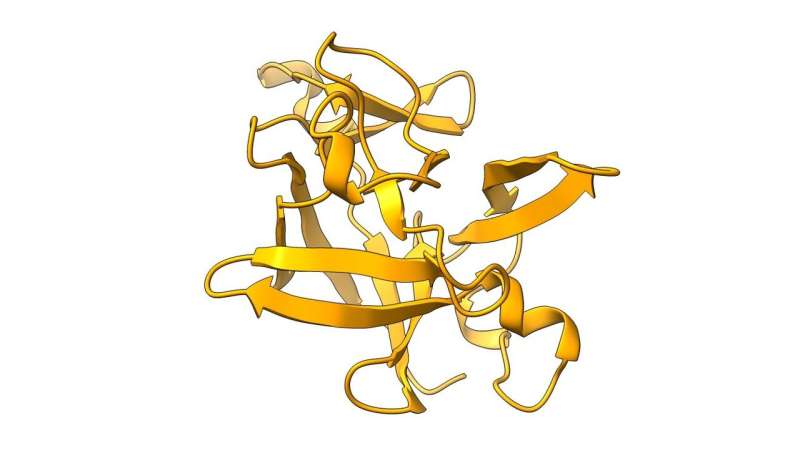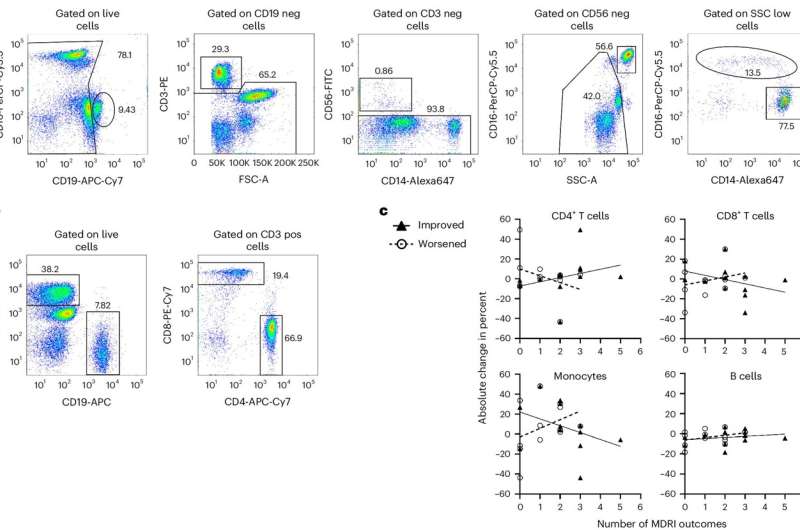This article has been reviewed according to Science X's editorial process and policies. Editors have highlighted the following attributes while ensuring the content's credibility:
fact-checked
peer-reviewed publication
proofread
Clinical trial reports promising new treatment reduces suffering in Sanfilippo syndrome

As a neurodegenerative disease characterized by childhood onset dementia, Sanfilippo syndrome causes immense suffering in many ways, including pain, loss of speech, extreme agitation, and distress, gastrointestinal symptoms, and profound sleep disturbance. With no approved treatment, clinical specialists have had few options to help alleviate this suffering until now.
A clinical trial collaboration between study lead and principal investigator Lynda Polgreen, MD, MS, Investigator at The Lundquist Institute for Biomedical Innovation at Harbor-UCLA (TLI) and Associate Professor of Pediatrics at the David Geffen School of Medicine at UCLA and Cure Sanfilippo Foundation's Chief Science Officer and study co-investigator, Cara O'Neill, MD, FAAP, used an innovative approach to treat this disease by targeting neuroinflammation, as it is thought to be a key contributor to disease symptoms.
The paper is published in the journal Nature Medicine.
Dr. Polgreen's team used anakinra, a recombinant interleukin-1 receptor antagonist, in children and young adults with moderate to advanced stages of the condition, meaning they were all experiencing debilitating, life-limiting symptoms at the time of study enrollment.
While ongoing clinical trials are searching for a cure for Sanfilippo syndrome, such trials are restricted to specific disease subtypes and include only the youngest of children exhibiting very few symptoms because the disease is considered irreversible. This has left more than 99% of the Sanfilippo population without any opportunity to receive focused treatment. However, the research team's revolutionary clinical study was designed to improve the representation of this long-excluded segment of the Sanfilippo community by treating individuals who have already been significantly impacted by their disease.
Sanfilippo syndrome, also known as mucopolysaccharidosis type III (MPS III), is considered an orphan disease, which classifies it for special considerations in drug development and policy. It is a rare genetic disorder in which the body is unable to break down the complex molecule heparan sulfate. Accumulation of heparan sulfate in cells then triggers several biological consequences, including inflammation, ultimately leading to progressive dementia and body-wide disease.
Anakinra works by inhibiting interleukin-1 (IL-1), a key mediator of the inflammatory response. By blocking the activity of IL-1, anakinra reduces harmful inflammation in the body and brain. For the first time, this study provides evidence that anakinra can positively impact meaningful disease symptoms in patients with Sanfilippo syndrome.
In the phase 1/2 trial, researchers evaluated anakinra's safety, tolerability, and effects on neurobehavioral, functional, and quality-of-life outcomes in patients with several subtypes of Sanfilippo syndrome. Results showed anakinra was safe and associated with significant improvements in multiple symptom domains.

By week 36 of treatment, 94% of participants showed improvement in at least one domain. Most adverse events were mild, with injection site reactions being the most common. Crucially, no serious adverse events related to the use of anakinra were reported, underscoring its safety profile.
Dr. Polgreen, the study's principal investigator, expressed optimism about the results, "The changes we observed in our patients represent significant improvements in the day-to-day lives of individuals with Sanfilippo syndrome and their families. This trial highlights the potential of anakinra as an adjunctive treatment option and underscores the broader importance of targeting downstream effects, such as inflammation, in lysosomal diseases."
"Together with Dr. Polgreen, we recognized an opportunity to translate existing preclinical proof of concept research into a drug repurposing trial which had the potential to benefit children imminently. Cure Sanfilippo Foundation is proud to have partnered with and supported this highly skilled and compassionate research team led by Dr. Polgreen (TLI), including the expertise of Dr. Eisengart (University of Minnesota) and Dr. Chen (TLI), to address the urgent needs of the patient community.
"We are also grateful to have collaborated with Sobi, who generously provided study drug. This close collaboration and integration of patient/caregiver perspectives have facilitated using novel outcome instruments and patient-centered study design that will inform future drug development in this ultra-rare disease," reflected Dr. O'Neill.
"Funding provided by Cure Sanfilippo Foundation to support all clinical trial activities and patient travel was made possible by generous donors and families who support the Foundation's mission; creating new opportunities to transform lives. We look forward to partnering with The Lundquist Institute to advance additional clinical programs," said Cure Sanfilippo Foundation President and Co-Founder Glenn O'Neill.
"This study has made immediate strides toward addressing the need to help all people touched by this condition, regardless of their level of disability," noted Julie Eisengart, Ph.D., Associate Professor of Pediatrics and Director of the Neurodevelopmental Program in Rare Disease at the University of Minnesota Medical School.
"This trial shows promise for improving the lived experience of not only the people diagnosed with Sanfilippo syndrome, but also their families who face countless disease-related stressors and heartache."
This study supports the potential of anakinra as a therapeutic option for Sanfilippo syndrome. It opens the door to its application in other MPS and similar neurodegenerative disorders characterized by neuroinflammation. With these encouraging results, further research is vital to explore the full potential of anakinra in changing the trajectory of Sanfilippo syndrome and providing hope to affected families worldwide.
More information: Lynda E. Polgreen et al, Anakinra in Sanfilippo syndrome: a phase 1/2 trial, Nature Medicine (2024). DOI: 10.1038/s41591-024-03079-3
















